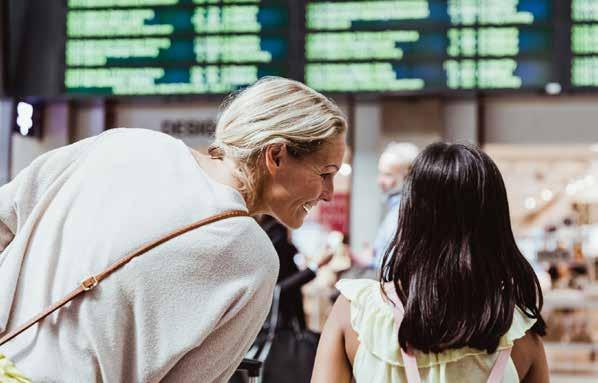
24 minute read
Board of Directors’ report

In February 2020, NRC Group presented a strategy update, positioning the company as a Nordic leader in sustainable infrastructure, with a clear priority to restore profitability and establish a growth roadmap towards NOK 10 billion in revenue and 7% EBITA margin in 2024. These ambitions stand firm, with the company implementing measures to improve profitability and building an execution platform that combines organic growth in existing markets with selective expansion into complementary services.
Advertisement
The ambitions are unaffected by the COVID-19 pandemic, which in 2020 impacted people and societies in the Group’s core markets. The pandemic had limited impact on operations owing to proactive measures and transparent communication providing for safe project execution in the field and remote work from home.
The implementation of improvement measures progressed as planned during the year. However, reduced overhead costs and improved project margins contributed positively to profitability. This was offset by weak results in the Environmental operation in Norway, additional write-downs in Sweden of the zero margin projects following the project adjustment in quarter four 2019, overcapacity costs in Finland and lower activity level in Civil in Norway. Hence, overall earnings were unsatisfactory, with an EBITA* margin below the target set by the Group in the beginning of the year.
NRC Group continues to prioritise profitability-over-growth. Improved tender processes enabled higher quality of the orderbook. Combined with improved project execution processes and a strengthened organisation, this provides a solid platform for improved profitability going forward.
In line with the strategy, NRC Group also strengthened Group management in 2020. Arild Moe was appointed new Executive Vice President (EVP) for Norway from November and Lene Engebretsen joined the management team as EVP Communications in May.
In 2020, NRC Group committed to strengthening the framework to minimise the impact on the external environment. This includes transparency and handling of the Group’s material environmental, social and governance (ESG) risks and opportunities, by identifying material topics and a climate risk analysis. The work includes consolidation of relevant data and goals with a globally recognised reporting system, Global Reporting Initiative (GRI) framework.
Introduction NRC Group is the leading Nordic entrepreneur within railway infrastructure, holding top-three positions in the railway construction and maintenance market in Norway, Sweden and Finland. The Group also offers civil construction services in Norway and Sweden, with complementary positions in environmental services in Norway.
A systematic approach to sustainability will support the strategic positioning as a Nordic leader in sustainable infrastructure and will drive commercial opportunities and attract new employees.
COVID-19 The COVID-19 pandemic impacted people, businesses and societies in the Group’s core markets during 2020. NRC Group adopted all relevant public guidelines and policies to prevent and handle COVID-19 incidents to safeguard personnel, ongoing operations, and business continuity.
The Group has secured regular and transparent communication of all relevant information, provided for safe project execution in the field, and enabled relevant personnel to work remotely from home.
The pandemic has overall had limited effect on operations, although new restrictions on workforce mobility towards the end of the year led to higher costs for certain projects. NRC Group will depend on the public transport agencies and municipalities in Norway, Sweden and Finland continuing to announce and award tenders in a timely manner in order to plan and efficiently execute projects in 2021 and onwards. The general observation is that tendering processes to a large extent have continued as scheduled, although certain projects such as SL Stockholm’s maintenance tenders were put on hold in 2020.
Parts of NRC Group’s activities are related to maintenance and upgrade of existing railway infrastructure, which are deemed critical functions by the authorities in NRC Groups markets. The company will prioritise these activities in case of resource scarcity.
The health and safety of employees remain the priority across all Group operations, together with delivering quality services to all clients. Further outbreaks and related public restrictions continue to represent health risks and risks for higher production costs or slower project execution. The Group closely monitors the development of the pandemic and its potential impact on the industry and on business continuity. The initiation of vaccination programs in early 2021 holds promise that the risk may be reduced over time.
STRATEGY EXECUTION NRC Group is positioned to benefit from large and growing infrastructure markets which are supported by strong macro trends such as population growth and urbanisation, stronger focus on sustainability, and political consensus for increased investments in Norway, Sweden and Finland.
NRC Group’s strategic target is to become a Nordic leader in sustainable infrastructure and the company has defined clear long-term financial and operational ambitions. The near-term priority is to restore profitability through operational improvements, and then capitalise on a leading Nordic position and strong markets and utilise its Nordic capabilities to expand into complementary services.
The 2024 margin ambition of 7% implies a return to the 2016-2017 average margins, with the main uplift to come from internal improvements. The NOK 10 billion revenue ambition is built on expected annual growth of 9% for the Nordic rail services market, organic growth and expansion opportunities in complementary services, and bolt-on M&As in existing segments and services. The Group believes that access to competent management capacity will be one of the most important factors to reach the ambitions. NRC Group aspires to be the most attractive employer for tomorrow’s infrastructure.
The Group has taken significant measures to professionalise the organisation, including change of management in business units with weak financial performance. The Group has also strengthened the tendering and risk assessment processes and project execution processes. The progress made across the Group in 2020 provides a platform for increased profitability and growth from 2021 onwards.
The positive result of improvement measures and organisational changes in NRC Group Sweden has been offset by additional write-downs on the zero-margin projects. In NRC Group Norway, the Rail division successfully strengthened the organisation and improved the tender and project execution processes. This yielded significant financial improvements but was offset by weak results in the demolition and recycling operation and lower activity in the Civil operation. NRC Group Finland has implemented measures during the year to reduce the costs and to establish a more flexible cost base. The financial effects from these measures are expected to take full effect in second quarter of 2021.
CORPORATE EVENTS In combination with the strategy update, NRC Group ASA on 12 February executed a NOK 700 million private placement at a subscription price of NOK 37 per share to enhance the financial strength and flexibility. During the year, the company acquired 216,887 treasury shares, whereof 202,542 shares were transferred to employees participating in the 2020 share programme for employees. At the end of the year, the
company had 26,842 treasury shares.
Two minor acquisitions were executed in Sweden during the year; Järnvägskonsulterna Bollnäs AB (JVK), and Gästrike Signal & Projektering AB (GSP), which expanded capabilities and capacity in line with the Group’s long-term strategic priorities.
ORGANISATION At the end of 2020, the Group management consisted of Henning Olsen as Chief Executive Officer (CEO), Dag Fladby as Chief Financial Officer (CFO), Robert Röder as Executive Vice President (EVP) and Managing Director (MD) NRC Group Sweden, Harri Lukkarinen as EVP and MD NRC Group Finland, Arild Ingar Moe as EVP and MD NRC Group Norway, Lene Engebretsen as EVP and Head of Communications and Mirka Nevala as EVP and Head of Business Development and Strategy.
The Annual General Meeting (AGM) on 6 May 2020 elected Tove Elisabeth Pettersen and David Christopher Montgomery as new independent members to the Board of Directors, replacing Harald Arnet and Kjersti Kanne. The remaining Board of Directors of NRC Group were re-elected. The AGM also re-elected Kjell Forsén (Chair) and Albert Collett to the Nomination Committee, and elected Lasse Olsen as new member of the committee.
NRC Group has been a consolidator of the fragmented Nordic market for railway and related infrastructure services. Growth is an integrated part of the Group strategy, both organically and through acquisitions, and M&A activities have played an important role in expanding the Group’s core competencies and capacity. Implementation of the updated strategy, programmes to improve the profitability and developing a group-wide sustainability and people development framework were focus areas for 2020. Main priorities for 2021 are to improve the core processes in tendering and project execution to restore the profitability.
OPERATIONS The Group had an order intake of NOK 5,339 million in 2020, compared to NOK 7,596 million in 2019. The order intake in 2019 included Jokeri light rail project in Finland, and Nykirke-Barkåker, the largest rail construction contract ever in NRC Group Norway. Orderbook at the end of the year amounted to NOK 6,475 million compared to NOK 7,151 million at the end of 2019.
NRC Group had 1,914 employees as of 31 December 2020, a decrease from 2,070 employees at the end of 2019.
NRC Group shall be a safe place to work. The Group continuously carries out preventive measures to improve its working environment, including safety drills, information, training and risk analysis, followed up by the individual subsidiaries. Sickness absence reported by the Group was 4.8% in 2020 compared to 3.5% in 2019. No serious injuries were reported for the year, compared to two such injuries in 2019. The Group immediately registers, deals with and follows up on all unwanted incidents. By the end of December, the Lost Time Injury (LTI) rate, which measures safety at work, defined as the number of work-related accidents with at least one full day absence per million working hours (including subcontractors), was 5.6 (6.0 in 2019). The Group systematically works to reduce the rate and investigates each incident to identify why and how the company can avoid similar incidents.
DECLARATION REGARDING THE FINANCIAL STATEMENTS The Board of Directors believes that the financial statements provide a true and fair view of the Group’s result for 2020 and the financial position at year end.
PROFIT AND LOSS Group revenue was NOK 6,449 million in 2020, compared to NOK 6,193 million in 2019, an increase of 4.1%. The increase is related to currency effects. EBITA* (*before other income and expenses) was NOK 50 million for 2020, corresponding to an EBITA* margin of 0.8%, compared to NOK 55 million and a margin of 0.9% in 2019. Profitability was negatively affected by lower profitability in Sweden due to additional write-downs of the zero margin projects, lower revenue in Civil operation in Norway reducing the profitability due to scale effects, and weak results in the demolition and recycling business. Finland delivered strong results in 2020.
The Group operating loss (EBIT) for 2020 amounted to NOK 10 million compared to an operating loss of NOK 105 million in the previous year. 2020 was negatively impacted by the developments described above. However, other income and expenses (M&A expenses) were reduced from NOK -91 million in 2019 to NOK -1 million in 2020. A major part of the M&A expenses in 2019 was related to the acquisition of VR Track and an adjustment of the contingent considerations in the business combination of Norsk Saneringsservice (NSS). Annual amortisation of intangible assets decreased from NOK 70 million in 2019 to NOK 59 million in 2020.

Net financial items amounted to NOK -84 million for 2020, compared to NOK -73 million last year. The company issued a NOK 600 million senior unsecured bond 13 September 2019 increasing the overall financial expenses.
Tax income amounted to NOK 34 million, compared to NOK 26 million in 2019. The tax income relates to the pre-tax loss adjusted for permanent differences. Most of the M&A expenses are not deductible for tax purposes as it for tax purposes must be capitalised as part of the cost of shares. Taxable income in Finland and in Sweden (maintenance) have also led to recognising tax assets of NOK 8 million not previously being recognised.
The Board of Directors is not satisfied with the results for 2020.
CASH FLOW Net cash flow from continuing operating activities was NOK 312 million, compared to NOK -38 million in 2019. EBITDA increased by NOK 87 million yearover-year. Net working capital and other accruals were reduced by NOK 66 million due to continuous focus on optimising working capital, compared to an increase last year of NOK 155 million. Cash flow from discontinued operations relates to the Design business sold in 2019.
Net cash flow from continuing investing activities was NOK -133 million for the year (2019: NOK -1,145 million). Investments in 2020 included settlement of a contingent consideration and final purchase price for Norsk Saneringsservice (NSS) and Gunnar Knutsen, amounting to NOK 96 million, and the acquisitions of Järnvägskonsulterna Bollnäs AB (JVK) and Gästrike Signal & Projektering AB (GSP), both in Sweden, for a cash consideration of SEK 27 million. Capital expenditures amounted to NOK 34 million (2019: NOK 40 million). Cash inflow from sale of fixed assets amounted to NOK 23 million (2019: NOK 41 million). In 2019, the cash payment for the acquisition of VR Track (NRC Finland) net of discontinued operations and cash in target, amounted to NOK 1,146 million. Net cash from discontinued operations in 2019 of NOK 214 million was related to the sale of the design business.
Net cash flow from financing activities was NOK 304 million (2019: NOK 628 million). Net proceeds from issuing new shares in the private placement amounted to NOK 672 million (2019: NOK 4 million). Repayment of borrowings amounted to NOK 119 million (2019: NOK 1,128 million). Payment of lease liabilities amounted to NOK 179 million (2019: NOK 165 million). Interest paid amounted to NOK 70 million (2019: NOK 84 million).
Total net cash flow was NOK 470 million (2019: NOK -232 million). Including effect of currency exchange rate changes, the total cash position increased from NOK 154 million at the end of 2019 to NOK 610 million at the end of 2020.
FINANCING AND BALANCE SHEET In 2020, the strengthening of the EUR and SEK exchange rates against NOK impacted all balance sheet items in foreign currency.
Intangible assets increased by NOK 211 million to NOK 3,010 million in 2020, reflecting mainly currency changes. Goodwill increased by NOK 169 million due to the GSP and JVK acquisitions (SEK 32 million in total) and currency translation effects. Deferred tax assets increased with NOK 46 million reflecting capitalised tax benefit related to timing differences and tax losses expected to be utilised in the following years. Other intangible assets decreased with NOK 4 million, reflecting that new investments and currency adjustments were lower than the total amortisations of NOK 59 million. New investments were mainly related to IT software separation investments in Finland following the transaction in 2019.
The combined amount of tangible and rightof-use assets increased by NOK 21 million due to currency as the total net investments and new leases were slightly less than the total depreciation of NOK 214 million.
Inventory is related to the operation in Finland and decreased by NOK 103 million following initiatives to reduce inventory and improve the working capital, including two larger transactions of materials to FTIA of approximately NOK 170 million in total in the first quarter and third quarter of 2020. Despite significant currency adjustments, total receivables including contract assets decreased by NOK 139 million to NOK 1,371, mainly due to sharp focus on measures to reduce the net working capital.
Total equity increased by 699 million to NOK 2,731 million. The increase is manly related to the private placement of new shares, raising NOK 700 million in gross proceeds in February. The equity ratio at the end of the year was 47% (2019: 37%).
Interest-bearing debt consists of bank loans, bond and discounted cash flow related to lease agreements, including operating lease agreements (mainly real estate rents) under IFRS 16. Short- and long-term lease liability has in total increased by NOK 48 million to NOK 573 million. The increase relates to currency effects in addition to capitalised

new leases exceeding the total lease payments of NOK 179 million. Other interest-bearing liability decreased by NOK 68 million explained by repayment of NOK 119 million partly offset by currency effects. On 31 December 2020, the remaining liability consisted of the NOK 600 million bond and a EUR 57.3 million bank loan. At year end, the Group had NOK 200 million in unused credit facilities.
Net interest-bearing debt decreased by NOK 475 million during the year. The decrease is mainly due to net cash proceeds from the private placement and positive operating cash flow net of instalments of interest-bearing debt, currency effects and investments.
SEGMENTS Total revenue in Norway amounted to NOK 1,866 million (2019: NOK 2,281 million). Organic growth was -18% due to lower activity in Civil construction, lower revenue in the demolition and recycling business in the Environmental division and planned reduced activity level in Rail Construction. EBITA* decreased from NOK 97 million in 2019 to NOK -14 million in 2020. The EBITA* margin decreased from 4.3% to -0.7%. The reduced profitability was due to weak results in the demolition and recycling business and lower results in the Civil operation, explained by lower revenues. Rail construction improved the profitability significantly due to a successful execution of the improvement program initiated in 2019.
Total revenue in Sweden amounted to NOK 1,777 million (2019: NOK 1,539 million). The organic growth was 4%. The remaining part of the revenue growth in NOK was due to currency effects. EBITA* amounted to NOK -69 million (2019: NOK -125 million). The result was negatively affected by additional write downs of the zero margin projects due to higher-than-expected production costs. This was partly offset by reduced overhead costs and positive development in other projects, reflecting measures initiated in second half of 2019 to restore profitability in Sweden.
Finland had a revenue of NOK 2,811 million (2019: NOK 2,388 million). The organic growth for the year was 8%, mainly driven by high activity on the Light Rail projects and high activity in sales of materials, while Maintenance was down due to loss of maintenance area 1 from second quarter 2020. The revenue in NOK was positively affected by currency effects. EBITA* amounted to NOK 161 million (2019: NOK 116 million). The EBITA* margin increased from 4.3% to 5.7%. The improved profitability was mainly driven the Light Rail projects. The total profitability was strong considering high production overhead, due to overcapacity as the activity levels was low in maintenance and in core rail operations.
CORPORATE SOCIAL RESPONSIBILITY NRC Group is committed to creating safe, low-carbon transport systems to efficiently connect people,

goods and cities. The company is a provider of safe and meaningful jobs for competent personnel, enabling efficient and profitable project execution. Ethical behaviour and well-developed governance frameworks are in place to enable NRC Group to become a Nordic leader in sustainable infrastructure.
NRC Group maintains constant focus on health and safety and on its commitment to provide quality services to all clients. The process of improving internal routines and risk management is continuous. Construction and infrastructure development are associated with climate and environmental responsibility. Increasing expectations from external and internal stakeholders alongside with stricter regulations, require sharp focus on minimising the impact on external environment and on safety considerations in tendering processes.
NRC Group recognises that its employees are the most important resource within the Group. The Group is committed to provide a safe and nurturing working environment, offering an inclusive working environment with equal opportunities, as well as recognising its responsibility to minimise negative impact on the environment.
During 2020, NRC Group identified material topics and completed a climate risk analysis, to enable the company to build greener solutions that connect people and cities. For the company to deliver sustainable solutions for tomorrow, NRC Group recognises its responsibility to minimise the impact on the external environment. To improve transparency related to the Group’s material environmental, social and governance (ESG) risks and opportunities and handling thereof, a separate Sustainability Report has been developed in accordance with the Global Reporting Initiative (GRI) framework. A separate section of this annual report contains a summary of the Sustainability Report, while the full report is available at www.nrcgroup.com.
CORPORATE GOVERNANCE NRC Group aims to comply with the Code of Practice for Corporate Governance published by the Norwegian Corporate Governance Board (NUES) on 17 October 2018.
A separate section of this annual report provides further details on NRC Group’s adherence to the corporate governance principles.
GOING CONCERN STATEMENT Pursuant to Section 3-3 of the Accounting Act, the Board confirms that the prerequisites for continued operations as a going concern have been met. This assumption is based on the financial position of the Group, forecasted results and cash flows for 2021 and the Group’s long-term strategic forecast for the coming years.
DIVIDEND NRC Group shall over time give shareholders a competitive return on their investment in the shares of the company, as a combination of dividends and share price returns. Provided that the underlying financial performance of NRC Group is satisfactory, it is NRC Group’s ambition over time to distribute a dividend of minimum of 30% of the profit for the year. Based on the 2020 results, the Board of Directors will not propose a dividend for 2020.
ALLOCATION OF PROFIT/LOSS FOR THE PARENT COMPANY The Board of Directors proposes the following allocation of the annual loss: Transfer from share premium NOK -56 million.
RISK AND UNCERTAINTY FACTORS NRC Group is exposed to operational, financial and market risks. The Group continuously monitors risk factors at a corporate and subsidiary level and takes appropriate action when needed to eliminate or mitigate any potential negative impact on operational and financial performance. Please also refer to the prospectus dated 11 March 2020 available at www.nrcgroup.com for a more detailed description of risk factors.
Operational risks include risk assessment and contingency appraisal in project tendering, project
execution, claims and legal proceedings, resource optimisation following fluctuations in seasonal demand in the business and ability to implement strategies, as well as macroeconomic conditions such as changes in government spending or demand. NRC Group aims to undertake operational risk that the business units can influence and control. NRC Group has developed risk management processes that are well adapted to the business. This includes analysis of project risk from the tendering phase through to completion to ensure appropriate pricing and risk management. NRC Group also seeks to minimise the exposure to risk that cannot be managed.
The Group is subject to local laws and regulations in the countries in which it operates and requires regulatory approvals for conducting its operations including personnel being qualified and having necessary local approvals. NRC Group also relies on its reputation and commercial integrity and has a continuous focus on operational excellence in project execution, as well as on compliance and ethical business conduct. From time to time, the Group may be engaged in disputes and legal or regulatory proceedings, which may affect operations and financial position. NRC Group is not involved in any governmental, legal or arbitration proceedings, which may have, or in recent past have had, significant negative impact on the Group’s financial position or profitability.
Financial risks include financial market risk, credit risk and liquidity risk. Financial market risks most relevant for the Group are currency risk and interest rate risk. A Group risk management policy for hedging is implemented to manage this risk. By having operational units in different functional currencies, NRC Group is exposed to currency translation risks related to subsidiaries in Sweden (SEK) and Finland (EUR). The Group uses currency loans to hedge net investments in foreign currencies. Most transactions in the Group are in local functional currencies. Significant transactions in other than functional currencies are assessed, and hedging instruments are considered to limit the risks associated with foreign exchange. The Group have a currency loan to hedge the net investment in Finland. The bond issued in September 2019 carries an interest of three months NIBOR + 4% until maturity 13 September 2024. The three months NIBOR has been hedged to a fixed rate of 1.838% for the full period. The fair market value of the hedge at the end of the year was NOK -25 million impacting other comprehensive income.
Liquidity risk is the risk that the Group will be unable to meet its financial obligations when they are due. The Group had total current assets of NOK 2,014 million at the end of the year, NOK 367 million more than short-term liabilities. Total cash amounted to NOK 610 million in addition to an unused multi-currency credit facility of NOK 200 million. The central management team and the local managers of the subsidiaries monitor the Group’s liquid resources and credit facilities through revolving forecasts based on expected cash flow. The cash flow is impacted by seasonal fluctuations. The current cash position and the multi-currency cash pool provides appropriate flexibility for managing cash flows and reserves within the Group.
Work in progress and trade receivables are set out contractually, which means that the amount of capital committed is determined by the credit terms of the contracts. NRC Group’s liquidity reserves will normally be at its lowest in the spring and summer due to the seasonality in the business.
NRC Group’s customers are primarily municipalities or government agencies, or companies or institutions where municipalities or government agencies have a dominant influence. NRC Group considers the risk of potential future bad debt losses from this type of customers to be low.
See note 24 of this report for a more detailed review of financial risk.
The Covid-19 outbreaks may still significantly
impact markets and operations going forward as the situation affects both operational, financial and market risks. The extent will depend on how the virus infection spreads and the measures that are implemented by the authorities. The Group follows public recommendations closely and continuously update internal policies accordingly. NRC Group project workers are active on a large number of projects in various locations, which reduces the risk. However, a scenario with wide-spread virus infection, significant impact on operations may occur. A substantial part of Group revenue comes from public customers with a low credit risk. Private sector clients will be closely followed up to minimise credit risk related to the coronavirus. The current orderbook limits the short-term impact on revenue. However, project execution and revenue will depend on the availability of project people including sub-contractors considering Covid-19 impact and restrictions and measures implemented by the authorities. It is likely that the situation may lead to delays in projects and additional expenses. Financial impact will depend on the contract terms on a project-by-project basis. Long-term, NRC Group sees limited negative impact on infrastructure investments.
EVENTS AFTER THE BALANCE SHEET DATE In January 2021, NRC Group appointed Jussi Mattsson as EVP Strategy and Business Development. He joined the NRC Group management team on 1 February. Based in Espoo/Helsinki, he leads NRC Group’s strategy development and implementation, including local strategic initiatives in Finland.
On 21 January, NRC Group announced an update on the estimated financial results. Preliminary results for 2020 indicated that the EBITA* would end around NOK 50 million resulting in an EBITA* margin for 2020 of 0.8%, which was lower than estimated in the release of the third quarter 2020 results. Estimated revenues for 2020 was NOK 6.45 billion. The estimates were in line with the final outcome.
OUTLOOK The overall demand for rail-based transport systems is expected to grow by approximately 7% annually in NRC Group’s markets in the coming years, supported by strong population growth, urbanisation, and an increasing need for environmentally sustainable transport solutions. This growth projection is well supported by approved national transport plans in Norway and Sweden and long-term plans in Finland, as well as already sanctioned upgrade and expansion projects, increased tendering activity, and the growing maintenance backlog related to the installed rail infrastructure in the Nordic region.
Railways, light-rail and metro lines are highly effective systems for environmentally friendly and sustainable transport of people and goods, and public plans to expand and modernise rail systems reflect national- and city-level political consensus across Norway, Sweden and Finland.
For 2021, NRC Group will prioritise continued improvements to restore profitability, targeting an EBITA*-margin of 1.75-2.5% for the full year. With a positive market outlook, strenghtened organisation and a strong tender pipeline, NRC Group is well positioned for further profitable growth from 2021 onwards.
Lysaker, 15 March 2021
Helge Midttun Chairman of the Board
Eva Nygren Board member
Tove Elisabeth Pettersen Board member Brita Eilertsen Board member
Rolf Jansson Board member
David Montgomery Board member Mats Williamson Board member
Henning Olsen CEO





